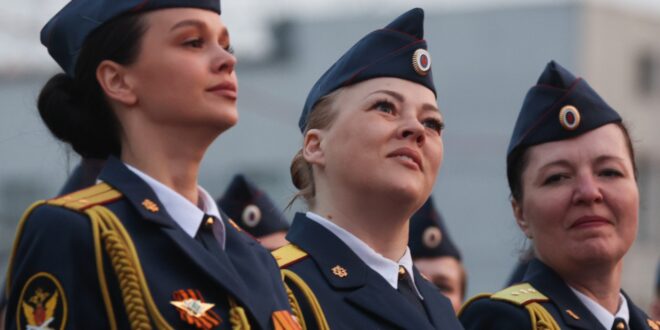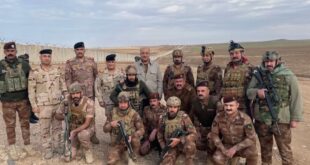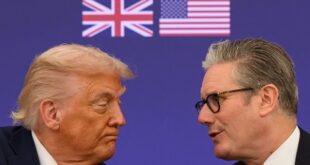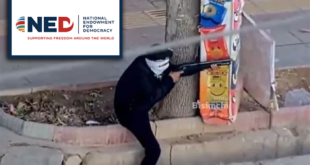One of the many jarring aspects of the pobedobesie (victory-mania) as Russia marks the Soviet victory over Nazi Germany every year is the commercialization — in particular, street vendors hawking tat to make a profit off the sacrifice of Soviet soldiers and civilians. Jarring, but also fitting. For this is the way war is remembered, and fought, in Russia today. Recruitment ads calling men to sign up to fight in Ukraine may be headed “For the Motherland, for Stalingrad,” but the small print explains it is also for the money.
To the unacquainted, such paradoxes undermine the Kremlin’s constant conflation of what Russia calls the Great Patriotic War and its current “special military operation” in Ukraine. But the Great Patriotic War is not just a constitutive part of Russian identity — it is also a constitutive part of mainstream Russian depictions of its nine-year war on Ukraine. Pro-war Russians conflate Ukrainian identity with treachery, extreme nationalism and Nazi collaborationism — and present themselves as reliving the feats of their Red Army ancestors by liberating Ukrainians from Nazi tyranny.
According to this narrative, Russia is fighting for the legacy of World War II by defeating fascism once more. While the Kremlin quietly dropped the term “denazification” as a justification for the invasion after it failed to take hold, Russian officials continue to frame the fight against Ukrainian-ness as a way to defend the memory and legacy of the Great Patriotic War. The 2023 Victory Day speeches and coverage will be no exception.
This is not a new analogy for the Russian media: it was used in 1991 to undermine Ukrainian independence; and in 2004 during the Orange Revolution. However, it was during Euromaidan and Russian aggression in Crimea and Donbas that this historical framework really hit the mainstream. Euromaidan supporters were classed as banderovtsy (followers of the World War II fascist Ukrainian nationalist, Stepan Bandera) and attributed genocidal russophobic intent. In this demented vision, Russia was forced to intervene to save Crimeans from genocide and to help the brave “pro-Russian Ukrainians” who were reliving their ancestors’ struggle against fascism.
While the use of the Great Patriotic War analogy rose and fell with the intensity of the conflict in east Ukraine between 2014 and 2021, it was always present in popular culture, particularly the glut of World War II films in which Ukrainians were typecast as good (cheeky yokels fighting alongside their Russian big brothers) or bad (traitors and Nazis in traditional Ukrainian dress). The stereotypes were not designed to inspire hatred against all Ukrainians, only against those who resisted the identity that Russians assigned to them.
After February 24, 2022, Russian state-aligned media once again embraced the Great Patriotic War analogies. They weren’t alone, of course. References to “Putler” have abounded in the West, while Ukrainian President Volodymyr Zelensky has also instrumentalized the memory of World War II, albeit with Ukrainians as the Red Army-worthy heroes and the Russians as Nazis.
This is unsurprising: analogies are always at a premium during crises, an influential if misleading heuristic when you need to make decisions fast. Even superficial analogies have meaningful effects on audience perceptions of — and prescriptions for — conflict. But the prominence of Russia’s Great Patriotic War cult, which has grown precipitously in symbiosis with Russian aggression against Ukraine, means it has primed audiences over the years to accept the legitimacy of Russian attacks on Ukrainian sovereignty and identity as a fight to defend the legacy of the Great Patriotic War.
Until recently, the intensification of war in Ukraine had gone hand in hand with the intensification of the Victory cult — but 2023 is proving an exception. The Russian authorities have cancelled or scaled back Victory Day parades in 23 regions, including those that border Ukraine, such as Kursk and Voronezh. These regions suffered some of the fiercest fighting during World War II (like Ukraine itself, and Belarus) and residents in Voronezh, for example, have long lobbied for greater recognition of this trauma. The downgrading of celebrations risks inflaming a perceived sense of injustice and, more troublingly for the authorities, it draws attention to the lack of anything to celebrate.
Given Putin’s reluctance to cancel the 2020 parade even at the height of the coronavirus pandemic, the choice to downgrade celebrations this year is likely one borne of necessity — tens of thousands of Russian soldiers have been killed in Ukraine and huge amounts of equipment destroyed. As one Voronezh acquaintance asked me, rhetorically: who and what would be parading anyway?
Coverage in regional media suggest locals understand the need to cancel the parades, but this hardly takes away from the destructive symbolism: the Russian authorities, having launched a war on Ukraine ostensibly to defend the memory of 1941-1945, are now unable to ensure the Russian people can safely commemorate the Great Victory at home.
The state, having hijacked the war’s legacy for its own political ends, has now endangered its commemoration, adding to a longstanding frustration with the government’s politicisation of the Great Patriotic War. Audience cynicism has been further aggravated by the perceived, and mocked, gap between state rhetoric and the reality on the battlefield. Comparisons by pro-Kremlin media with the epic heroism, and successful outcomes, of the battles for Stalingrad, Kyiv and Berlin strike a hollow contrast with the Russian army’s failure to seize and hold even one Ukrainian regional capital since its full-scale invasion last year.
Continued Russian military underperformance in Ukraine and the insistent use of World War II analogies raise the prospect that the government will be seen as besmirching the memory of the Great Victory. It would be a bittersweet irony if the Kremlin’s own exploitation of the Great Patriotic War cult led to a dent in the state’s stranglehold over historical narrative and, by extension, narratives of Russia’s war on Ukraine. It is an axiom that revolutions eat themselves, but cults can be cannibalistic too.
 Eurasia Press & News
Eurasia Press & News



